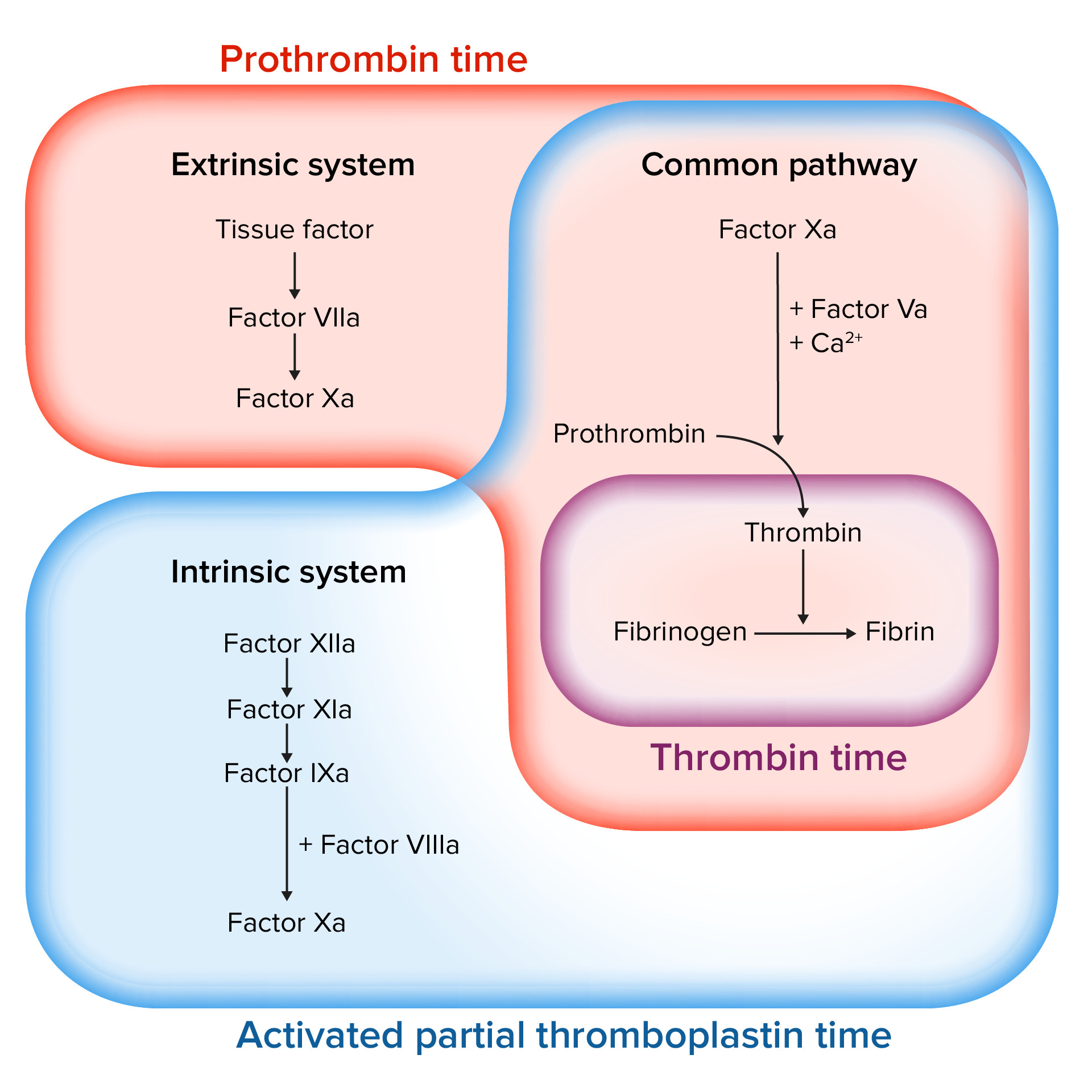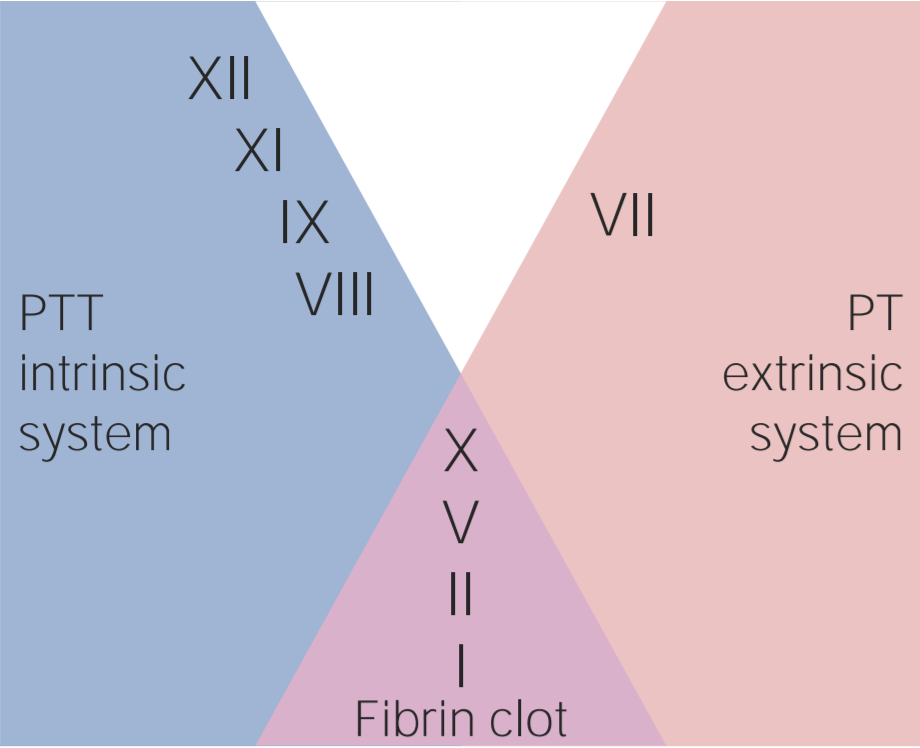Playlist
Show Playlist
Hide Playlist
Questions: Coagulant Drugs
-
Slides Questions Coagulant Drugs.pdf
-
Reference List Pharmacology.pdf
-
Download Lecture Overview
00:01 Let's try a question in anticoagulation. The first question. 00:06 The following medication will act upon thrombin in the serum and thrombin enmeshed within clots. 00:13 Take a look at these choices and try to come up with a good answer. 00:20 So the answer is A, bivalirudin. 00:24 Now when we talk about bivalirudin, remember that the heparins in general like enoxaparin, unfractionated heparins are generally large molecules, and they don't go inside the clot. 00:35 They do not work on the thrombin that is already enmeshed within the clot. 00:40 Protamine is a base that inactivates heparin and not thrombin, so that's not the choice. 00:46 Fondaparinux is a pentamer moiety that is cleaved from heparin. 00:50 It does not affect the thrombin that is already enmeshed within the clot. 00:54 And then of course the bivalirudin is coming from the medicinal leech, it's a direct thrombin inhibitor, and that acts on enmeshed thrombin. 01:03 So, that's why A is the correct answer. 01:06 Here's a great question on coagulation. A patient with a history of atrial fibrillation arrives in the emergency room with an acute GI bleed and a nosebleed. 01:15 He has a medical bracelet that says "anticoagulants". The spouse says that the patient was not required to have monthly blood monitoring. The pharmacy dispensed dabigatran in the last month. 01:26 What would the most appropriate antidote be? Have a look at these choices, and tell me which one is the most appropriate antidote. 01:38 So the answer is E, idarucizumab. 01:42 So idarucizumab is a monoclonal antibody. It is the new way to treat overdose from dabigatran. 01:50 This is a new treatment. 01:52 Before we used to use Octaplex, Beriplex, or Kcentra, which are 4-factor prothrombin complex concentrates, or “PCCs”. This is an important thing for you to remember because when you're using old exams to study from, the old answer would have been a 4-factor PCC. The new answer is this drug. 02:11 We can use a 4-factor PCC to reverse or neutralize the anticoagulant effects caused by factor Xa inhibitors like rivaroxaban and apixaban. We can also use an antifibrinolytic agent like tranexamic acid, and there is also a specific monoclonal antibody, andexanet alfa, that can be used to reverse the anticoagulant effects of rivaroxaban and apixaban. It has no effect on dabigatran. 02:38 Idarucizumab does not work against rivaroxaban and apixaban. 02:43 Remember that each vial of this drug is about 3,500 dollars per dose. 02:49 It's exceedingly expensive but it's also exceedingly active. 02:53 What is the mechanism of action of clopidogrel? Does it block an enzyme that produces factor VIII? Is it a cyclooxygenase inhibitor? Does it bind to ADP receptors or cyclic AMP receptors? Or does it bind to glycoprotein IIb/IIIa receptors? The answer is C, it binds to ADP receptors. 03:16 So remember that cloipidogrel binds to the ADP receptor on the platelet surface. 03:22 This prevents recruitment and aggregation of the platelets. 03:26 Remember that aspirin inhibits cyclooxygenase. Remember that factor VIII is reduced in certain types of hemophiliacs. 03:35 And direct glycoprotein IIb/IIIa inhibitors are these drugs here, and they are very active but very specific.
About the Lecture
The lecture Questions: Coagulant Drugs by Pravin Shukle, MD is from the course Pharmacology of Blood Coagulation. It contains the following chapters:
- Question 1: Pharmacology of Coagulation
- Case Study 1: Pharmacology of Coagulation
- Question 2: Pharmacology of Coagulation
Included Quiz Questions
What is the mechanism of action of bivalirudin?
- Direct thrombin inhibitor
- Factor X inhibitor
- Activation of antithrombin
- Vitamin K antagonist
- P2Y12 receptor blocker
What is an indication for idarucizumab?
- Reversal of the anticoagulant effects of dabigatran
- Reversal of the anticoagulant effects of heparin
- Prevention of warfarin-induced skin necrosis
- Prevention of heparin-induced thrombocytopenia
- Reversal of procoagulant medications
Customer reviews
5,0 of 5 stars
| 5 Stars |
|
5 |
| 4 Stars |
|
0 |
| 3 Stars |
|
0 |
| 2 Stars |
|
0 |
| 1 Star |
|
0 |





